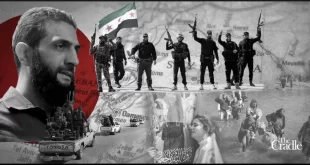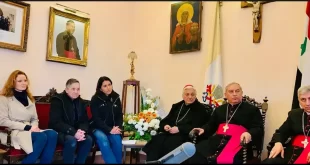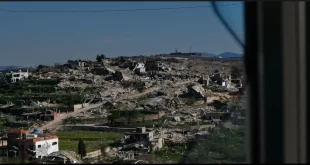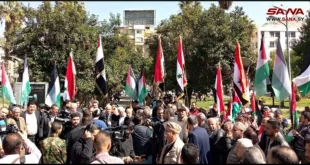by Mouhamad Choucair, published on The Cradle, February 23, 2022
Up in the mountainous region of Lebanon’s Bekaa Valley, the climate is extreme between snowy winters and suffocating summer heat. Yet this is the site of one of the country’s refugee camps for displaced Syrians.
Helplessly exposed to the harsh living conditions of the Bekaa Valley, many refugees have died in the camp over the years, among them infants, children, and the elderly, while hundreds continue to suffer from serious health conditions.
There have recently been calls in Lebanon for the provision of better services for Syrian refugees and to help facilitate their voluntary return to Syria. However, political divisions in Lebanon over refugee entry requirements have created multiple obstacles in allowing them to return.
According to the UN High Commissioner for Refugees (UNHCR), Lebanon now hosts the largest amount of refugees per capita in the world, 1.5 million of whom are Syrian.
After the catastrophic 2019 economic collapse of the country, nine out of ten Syrian refugees fell below the extreme poverty line, with half of these suffering food insecurity.
By the end of 2014, the Lebanese government had made a decision to stop accepting Syrian refugees. The UNHCR, however, took advantage of existing political differences within the government, and continued to accept and register Syrian refugees arriving into Lebanon.
A politicized issue
Meanwhile, Lebanon had disengaged from managing and regulating the entry of Syrian refugees. Disputes arose over allowing their voluntary return to Syria or enforcing their integration into Lebanon.
The lack of involvement from the economically and politically-weakened Lebanese state meant that NGOs took over the management of Syrian refugees and called for their settlement into Lebanese society.
The position of the international community in rejecting the voluntary return of Syrian refugees has not changed over the years, as evidenced by several conferences on the issue. The Lebanese government, in the meantime, has been subjected to immense pressure to accept the settlement of Syrian refugees.
At the invitation of Germany, and with the presence of the Lebanese Prime Minister, the International Support Group met on 28 October, 2014, in Berlin.
The aim was to grant Syrian refugees the right to naturalization in accordance with the 1951 United Nations Convention relating to the Status of Refugees.
This complicated matters further, leading Lebanon’s President Michel Aoun to openly state at the UN’s podium on 21 September 2017: “The decision is ours, and ours alone; and we reject resettlement.”
Prevented from returning
Western states, however, continue to besiege Syria and to prevent the return of those displaced by setting conditions, such as the need to wait until Syria is rebuilt, and for the right conditions, or what they call “a safe, voluntary, and dignified return.”
Over the past decade, around 13 million Syrians have been displaced, and while more than five million of them are refugees hosted in Turkey, Lebanon, Jordan, Iraq and Egypt, almost seven million remain displaced inside Syria – so the definition of “safe,” in this case, is open to interpretation.
Foreign adversaries of the Syrian government have, in fact, opposed the return of Syrians to their country, fearing that their return may provide the Syrian army with fighters.
Dr Ali Faour, a Lebanese researcher in population and migration studies, says that the number of Syrian refugees registered with UNHCR in Lebanon was 865,331 by the end of 2020, while a more likely number is estimated at two million – many of whom enter the country through illegal trafficking.
The refugee issue, suggests Faour, is politically complicated due to severe internal Lebanese divisions. He says it is directly linked to regional political rivalries and a western-enforced siege on Syria – with Lebanon a victim of its own weak sovereignty.
If Syria returns to the Arab League as expected, this issue can be resolved through direct negotiations between Lebanon and Syria.
Nevertheless, direct talks with Syria are strongly rejected by political parties of Lebanon’s anti-Syria, March 14 coalition, particularly the leader of the pro-west Progressive Socialist Party (PSP), Walid Jumblatt, and the head of the right-wing Lebanese Forces party, Samir Geagea, who have launched a major political and media campaign against any direct negotiation with Damascus.
At the time, Jumblatt claimed that returning refugees to their country would put their lives at risk, and that hundreds of people who returned had ended up in ‘Assad’s prisons,’ their fate unknown.
Such unconfirmed allegations conceal a clear political position: preventing communication with a Syrian government that is out of favor with Arab Gulf leaders, many of whom were key funders and organizers of militants fighting the Syrian army.
However, in recent months some of these states have restored or upgraded relations with Damascus.
There are no ‘refugees’ in Lebanon
Since Lebanon never signed the 1951 United Nations Convention relating to the Status of Refugees of its 1967 protocol, Syrian nationals who fled their country’s conflict, are not classified as ‘refugees.’
According to Professor of International Law at the Lebanese University Antonios Abou Kasm this agreement and its protocol are neither binding on the Lebanese state, nor have any legal effect on it.
Regardless, the international community insists that the return of Syrian refugees to their homes remain voluntary, while encouraging them to stay in Lebanon and integrate into Lebanese society.
Sources indicate that returnees to Syria have encountered a vital obstacle: security issues, particularly in areas near Damascus, which are constantly subject to attacks by Israel, and where military sites and areas of operations are still widely present.
According to Abou Kasm the Syrian government does not encourage the return of Syrian refugees for demographic, political, economic and strategic reasons. Rather the reason for the delay their return, he argues, is the division in the official Lebanese position on this issue. Furthermore, the majority of Syrian nationals in Lebanon prefer to stay for economic reasons, he says.
Syrian refugees can count on the financial support of the UNHCR, as well as on the support of a large number of international NGOs. More importantly, labor wages in Lebanon are high – particularly skilled ones – when compared to Syria.
Since the collapse of the Lebanese lira exchange rate, the conditions of all those who receive ‘hard currency’ donations, including displaced persons and refugees, have improved due to the meteoric rise in the value of the dollar, which doubles the value of consumption.
In terms of those who work in agriculture, Syrian farmers have been unable to harvest their olive crops, many of which are located in the northern province of Idlib and other regions that are scenes of ongoing conflict.
This harvest failure has affected the local Lebanese market, where there has been a severe shortage of olive oil, and a sharp increase in its price.
Due to the absence of fixed, official refugee camps in Lebanon – and hence the dispersion of Syrians within Lebanese communities – a number of financial incentives have emerged to benefit Lebanon’s citizenry in parallel, as is the case in Turkey and Jordan.
In the latter countries, the United Nations provided landowners with $800 for each dunum (1000 square meters) of tents for those displaced. The owner of the land, the mukhtar (a local term for ‘chief’), coordinated with security forces to register those who live on his land and those who left; also illegally employing refugees – especially women – in the food and agricultural industries.
The mukhtar received 4,000 Lebanese liras per day from each refugee’s wages of around 12,000 liras – this, of course, was before the collapse of the lira against the US dollar.
Meanwhile, in neighboring Jordan, the government managed an economic juggling act, whereby it indirectly imposed a tax on international donations for Syrian refugees, which benefited Amman’s coffers.
An ulterior motive?
There are also social obstacles, particularly among those Syrians who grew up, or were born in Lebanon. According to one UN teacher who spoke to The Cradle, in addition to international aid, there were also social and educational incentives for refugees, which encouraged them to remain in Lebanon. These incentives include the advanced educational system in Lebanon which provide refugees with high educational skills.
After the collapse of the Lebanese lira, refugee aid was distributed in hard foreign currency, and many refugees were able to transfer their children to private schools, a step which could later facilitate migration to Europe.
The interests of Europe and the international community in resettling Syrian nationals in Lebanon, according to Abou Kasm, is also to curb a migration influx to their countries.
It can be argued that the naturalization of the mostly-Sunni Syrian refugees can tip the demographic balance in Lebanon in favor of the Sunni sect, potentially curbing the influence of Shias and reducing the role of Lebanon’s resistance movement, Hezbollah.
In the view of Abou Kasm, this demographic change could lead to a Sunni–Shia conflict that may be used as a tool to strike at Hezbollah and its allies.
The issue of displaced Syrian refugees living in Lebanon seeking to return to their country may not be ending anytime soon.
Their situation is more likely to remain the subject of internal Lebanese political disputes, biding time until Syria and Lebanon find their way to direct and meaningful dialogue.
Mouhamad Choucair is a regional journalist with a degree in media from the University of Algiers in 1992. He specializes in African affairs and covers the war in Yemen and its regional ramifications – Asian, African and international.
 Syria Support Movement solidarity with the Syrian people
Syria Support Movement solidarity with the Syrian people




